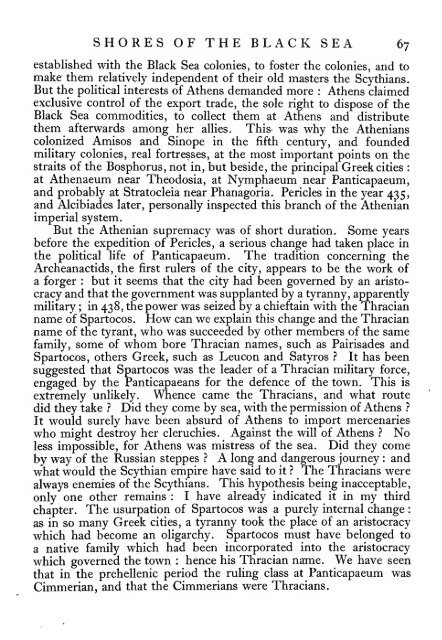Iranians and Greeks in South Russia - Robert Bedrosian's Armenian ...
Iranians and Greeks in South Russia - Robert Bedrosian's Armenian ...
Iranians and Greeks in South Russia - Robert Bedrosian's Armenian ...
You also want an ePaper? Increase the reach of your titles
YUMPU automatically turns print PDFs into web optimized ePapers that Google loves.
SHORES OF THE BLACK SEA 67<br />
established with the Black Sea colonies, to foster the colonies, <strong>and</strong> to<br />
make them relatively <strong>in</strong>dependent of their old masters the Scythians.<br />
But the political <strong>in</strong>terests of Athens dem<strong>and</strong>ed more : Athens claimed<br />
exclusive control of the export trade, the sole right to dispose of the<br />
Black Sea commodities, to collect them at Athens <strong>and</strong> distribute<br />
them afterwards among her allies. This- was why the Athenians<br />
colonized Amisos <strong>and</strong> S<strong>in</strong>ope <strong>in</strong> the fifth century, <strong>and</strong> founded<br />
military colonies, real fortresses, at the most important po<strong>in</strong>ts on the<br />
straits of the Bosphorus, not <strong>in</strong>, but beside, the pr<strong>in</strong>cipal Greek cities :<br />
at Athenaeum near Theodosia, at Nymphaeum near Panticapaeum,<br />
<strong>and</strong> probably at Stratocleia near Phanagoria. Pericles <strong>in</strong> the year 435,<br />
<strong>and</strong> Alcibiades later, personally <strong>in</strong>spected this branch of the Athenian<br />
imperial system.<br />
But the Athenian supremacy was of short duration. Some years<br />
before the expedition of Pericles, a serious change had taken place <strong>in</strong><br />
the political life of Panticapaeum. The tradition concern<strong>in</strong>g the<br />
Archeanactids, the first rulers of the city, appears to be the work of<br />
a forger : but it seems that the city had been governed by an aristocracy<br />
<strong>and</strong> that the government was supplanted by a tyranny, apparently<br />
military ; <strong>in</strong> 438, the power was seized by a chiefta<strong>in</strong> with the Thracian<br />
name of Spartocos. How can we expla<strong>in</strong> this change <strong>and</strong> the Thracian<br />
name of the tyrant, who was succeeded by other members of the same<br />
family, some of whom bore Thracian names, such as Pairisades <strong>and</strong><br />
Spartocos, others Greek, such as Leucon <strong>and</strong> Satyros ? It has been<br />
suggested that Spartocos was the leader of a Thracian military force,<br />
engaged by the Panticapaeans for the defence of the town. This is<br />
extremely unlikely. Whence came the Thracians, <strong>and</strong> what route<br />
did they take } Did they come by sea, with the permission of Athens ?<br />
It would surely have been absurd of Athens to import mercenaries<br />
who might destroy her cleruchies. Aga<strong>in</strong>st the will of Athens ? No<br />
less impossible, for Athens was mistress of the sea. Did they come<br />
by way of the <strong>Russia</strong>n steppes ? A long <strong>and</strong> dangerous journey : <strong>and</strong><br />
what would the Scythian empire have said to it ? The Thracians were<br />
always enemies of the Scythians. This hypothesis be<strong>in</strong>g <strong>in</strong>acceptable,<br />
only one other rema<strong>in</strong>s : I have already <strong>in</strong>dicated it <strong>in</strong> my third<br />
chapter. The usurpation of Spartocos was a purely <strong>in</strong>ternal change :<br />
as <strong>in</strong> so many Greek cities, a tyranny took the place of an aristocracy<br />
which had become an oligarchy. Spartocos must have belonged to<br />
a native family which had been <strong>in</strong>corporated <strong>in</strong>to the aristocracy<br />
which governed the town : hence his Thracian name. We have seen<br />
that <strong>in</strong> the prehellenic period the rul<strong>in</strong>g class at Panticapaeum was<br />
Cimmerian, <strong>and</strong> that the Cimmerians were Thracians.

















